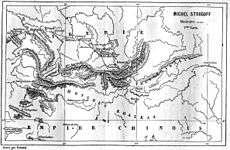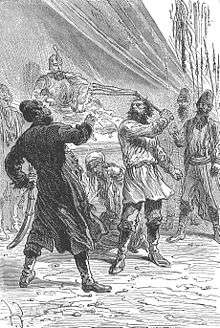Michael Strogoff
 First edition, 1876 | |
| Author | Jules Verne |
|---|---|
| Original title | Michel Strogoff |
| Translator | Agnes Kinloch Kingston (published under her husband's name: W. H. G. Kingston) |
| Illustrator | Jules Férat |
| Country | France |
| Language | French |
| Series | The Extraordinary Voyages #14 |
| Genre | Adventure novel |
| Publisher | Pierre-Jules Hetzel |
Publication date | 1876 |
Published in English | 1876 |
| Media type | Print (Hardback) |
| Preceded by | The Survivors of the Chancellor |
| Followed by | Off on a Comet |
Michael Strogoff: The Courier of the Czar (French: Michel Strogoff) is a novel written by Jules Verne in 1876. Critics, including Leonard S. Davidow, writing from Reading, Pennsylvania, in his 1937 introduction to The Spencer Press reprint as a volume in its "Classic Romances of Literature" series consider it one of Verne's best books. Davidow wrote, "Jules Verne has written no better book than this, in fact it is deservedly ranked as one of the most thrilling tales ever written." Unlike some of Verne's other novels, it is not science fiction, but a scientific phenomenon (Leidenfrost effect) is a plot device. The book was later adapted to a play, by Verne himself and Adolphe d'Ennery. Incidental music to the play was written by Alexandre Artus in 1880. The book has been adapted several times for films, television and cartoon series.
Plot summary


Michael Strogoff, a 30-year-old native of Omsk, is a courier for Tsar Alexander II of Russia. The Tartar Khan (prince), Feofar Khan, incites a rebellion and separates the Russian Far East from the mainland, severing telegraph lines. Rebels encircle Irkutsk, where the local governor, a brother of the Tsar, is making a last stand. Strogoff is sent to Irkutsk to warn the governor about the traitor Ivan Ogareff, a former colonel, who was once demoted and exiled and now seeks revenge against the imperial family. He intends to destroy Irkutsk by setting fire to the huge oil storage tanks on the banks of the Angara River.

On his way to Irkutsk, Strogoff meets Nadia Fedor, daughter of an exiled political prisoner, Basil Fedor, who has been granted permission to join her father at his exile in Irkutsk, the English war correspondent Harry Blount of the Daily Telegraph and Alcide Jolivet, a Frenchman reporting for his 'cousin Madeleine'. Blount and Jolivet tend to follow the same route as Michael, separating and meeting again all the way through Siberia. He is supposed to travel under a false identity, posing as the pacific merchant Nicolas Korpanoff but he is discovered by the Tartars when he meets his mother in their home city of Omsk.
Michael, his mother and Nadia are eventually taken prisoner by the Tartar forces. Ivan Ogareff alleges that Michael is a spy. After opening the Koran at random, Feofar decides that Michael will be blinded as punishment in the Tartar fashion, with a hot blade. For several chapters the reader is led to believe that Michael was indeed blinded, but it transpires in fact that he was saved from this fate (his tears at his mother evaporated and saved his corneas) and was only pretending.
Eventually, Michael and Nadia escape, and travel to Irkutsk with a friendly peasant. They are delayed by fire and the frozen river. However, they eventually reach Irkutsk, and warn the Tsar's brother in time of Ivan Ogareff. Nadia's father, who has been appointed commander of a suicide battalion, and later pardoned, joins them and Michael and Nadia are married.
Sources of information
Exact sources of Verne's quite accurate knowledge of contemporary Eastern Siberia remain disputed. One popular version connects it to the novelist's meetings with anarchist Peter Kropotkin; however, Kropotkin arrived in France after Strogoff was published.[1] Another, more likely source, could have been Siberian businessman Mikhail Sidorov. Sidorov presented his collection of natural resources, including samples of oil and oil shales from Ukhta area, together with photographs of Ukhta oil wells, at the 1873 World Exhibition in Vienna, where he could have met Verne.[1] Real-world oil deposits in Lake Baikal region do exist, first discovered in 1902 in Barguzin Bay and Selenge River delta,[2] but they are nowhere near the commercial size depicted by Verne.[3]
Verne's publisher Pierre-Jules Hetzel sent the manuscript of the novel to the Russian writer Ivan Turgenev in August 1875 asking him for his comments on the accuracy of the conditions described in the book [4]
While the physical description of Siberia is accurate, the Tartar rebellion described is entirely fictional and rather implausible. Wars with Tartars and Mongols were a major aspect of Medieval Russian history, but the Russians gained the upper hand long before the 19th Century, and no Tartar Khan at the time of writing was in a position to act as Feofar is described as doing; depicting late 19th Century Tartars as able to face Russians on anything resembling equal terms is a manifest anachronism.
Adaptations
| Title | Year | Country | Director | Strogoff | Notes | Refs |
|---|---|---|---|---|---|---|
| Michael Strogoff | 1914 | US | Lloyd B. Carleton | Jacob P. Adler | silent | |
| Michel Strogoff | 1926 | France / Germany | Victor Tourjansky | Ivan Mosjoukine | silent | [5] |
| Michel Strogoff | 1935 | France | Jacques de Baroncelli, Richard Eichberg |
Anton Walbrook | [6] | |
| Der Kurier des Zaren | 1936 | Germany | Richard Eichberg | Anton Walbrook | [7] | |
| The Soldier and the Lady | 1937 | US | George Nicholls, Jr. | Anton Walbrook | later released as Michael Strogoff | [8] |
| Miguel Strogoff | 1943 | Mexico | Miguel M Delgado | Julián Soler | [9] | |
| Michel Strogoff | 1956 | France, Italy, Yugoslavia | Carmine Gallone | Curd Jürgens | [10] | |
| Le Triomphe de Michel Strogoff | 1961 | France, Italy | Victor Tourjansky | Curd Jürgens | [11] | |
| Strogoff | 1970 | Bulgaria, France, Italy | Eriprando Visconti | John Phillip Law | Released in Germany as Der Kurier des Zaren and in France as Michel Strogoff | [12] |
| Michel Strogoff | 1975 | Austria, France, Germany, Switzerland, Hungary | Jean-Pierre Decourt | Raimund Harmstorf | 4-part TV drama | [13] |
| Michele Strogoff, il corriere dello zar | 1999 | Germany, France, Italy | Fabrizio Costa | Paolo Seganti | [14] | |
| Les Aventures extraordinaires de Michel Strogoff | 2004 | France | Bruno-René Huchez, Alexandre Huchez |
Anthony Delon | ||
| Michael Strogoff | 2013 | Italy | episode of TV series "JV: The Extraordinary Adventures of Jules Verne"; totally divergent plot | [15] |
The town of Marfa, Texas was named after the character Marfa Strogoff in this novel.[16]
References
- 1 2 Fuks, Matveychuk, pp. 371-373
- ↑ Fuks, Matveychuk, pp. 374-375
- ↑ Fuks, Matveychuk, p. 372
- ↑ I.S. Turgenev, Polnoe sobranie sochinenii i pisem v 30 tomakh: Pis'ma, vol. 14 (1875) (Moscow, 2003), p. 136.
- ↑ "Michel Strogoff" British Film Institute, retrieved 9 February 2014
- ↑ "Michel Strogoff", British Film Institute, retrieved 9 February 2014
- ↑ "Der Kurier des Zaren", British Film Institute, retrieved 9 February 2014
- ↑ "Michael Strogoff", IMDb, retrieved 9 February 2014
- ↑ "Miguel Strogoff", IMDb, retrieved 9 February 2014
- ↑ "Michel Strogoff", British Film Institute, retrieved 9 February 2014
- ↑ "Le triomphe de Michel Strogoff", British Film Institute, retrieved 9 February 2014
- ↑ "Strogoff", British Film Institute, retrieved 9 February 2014
- ↑ " Michel Strogoff", British Film Institute, retrieved 9 February 2014
- ↑ "Michele Strogoff, il corriere dello zar", British Film Institute, retrieved 9 February 2014
- ↑ "Les aventures extraordinaires de Michel Strogoff ", British Film Institute, retrieved 9 February 2014
- ↑ "Marfa". The Southwestern Historical Quarterly. 48: 295. 1944. ISSN 0038-478X. LCCN 12-20299. OCLC 1766223. Retrieved 2013-05-05.
Sources
- Fuks, Igor; Matveychuk, Alexander (2008). Istoki rossiyskoy nefti (Истоки российской нефти) (in Russian). Moscow: Drevlekhranilische. ISBN 978-5-93646-137-8.
External links
| Wikimedia Commons has media related to Michael Strogoff. |
| Wikisource has original text related to this article: |
| French Wikisource has original text related to this article: |
- Michael Strogoff at Project Gutenberg
- Michael Strogoff - A play in Five Acts and Sixteen Scenes from JV.Gilead.org.il
-
 Michael Strogoff public domain audiobook at LibriVox
Michael Strogoff public domain audiobook at LibriVox